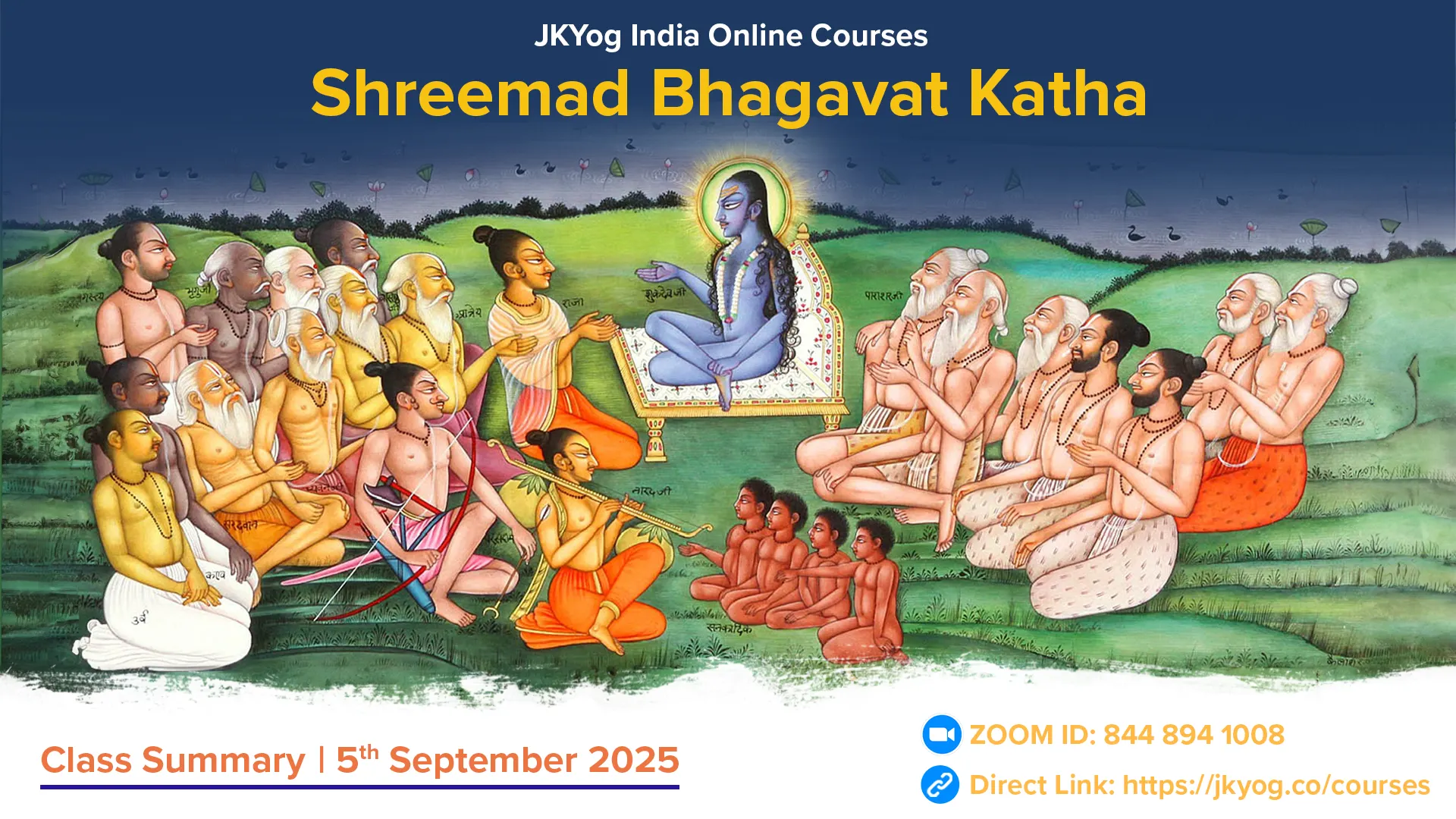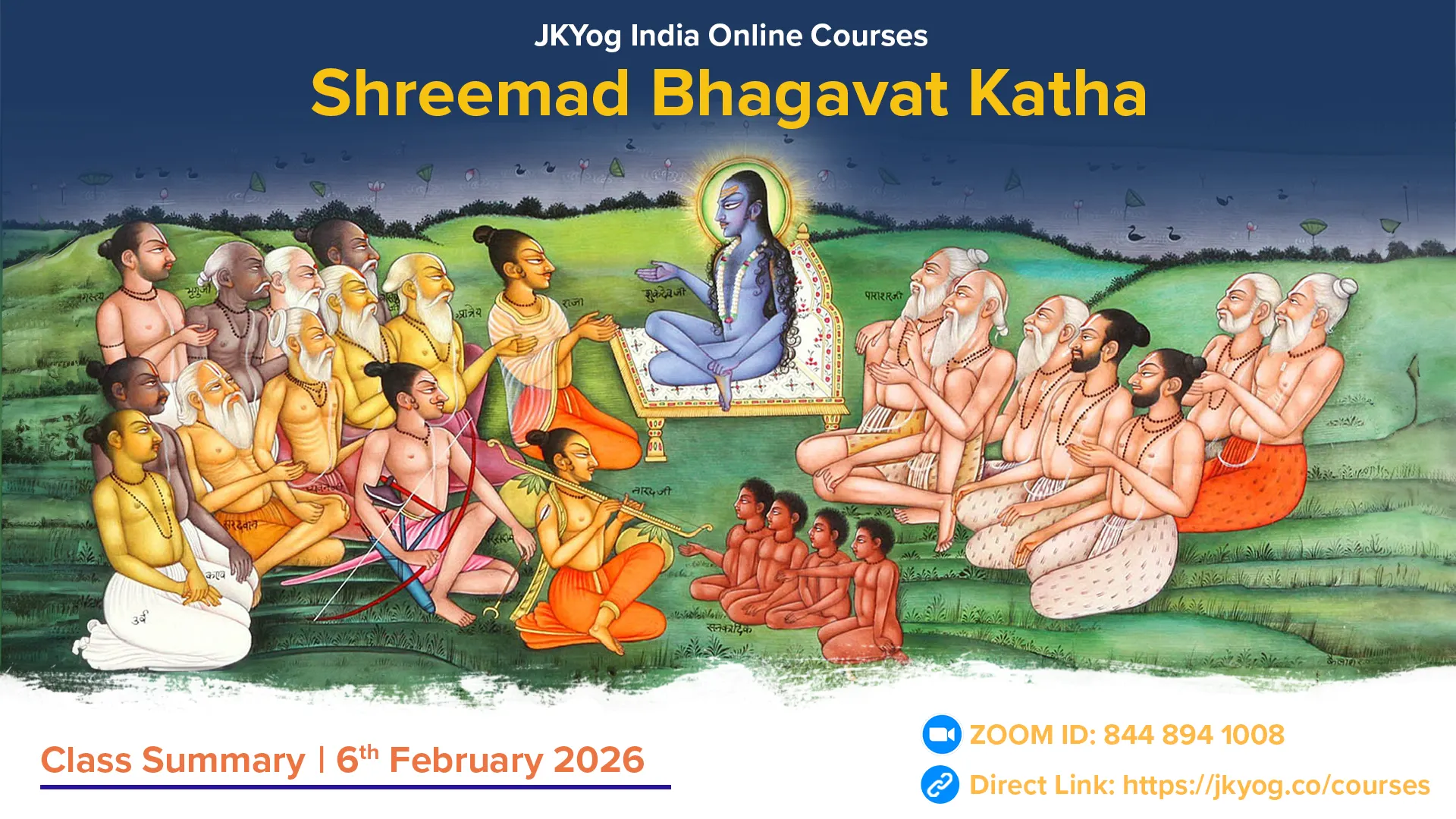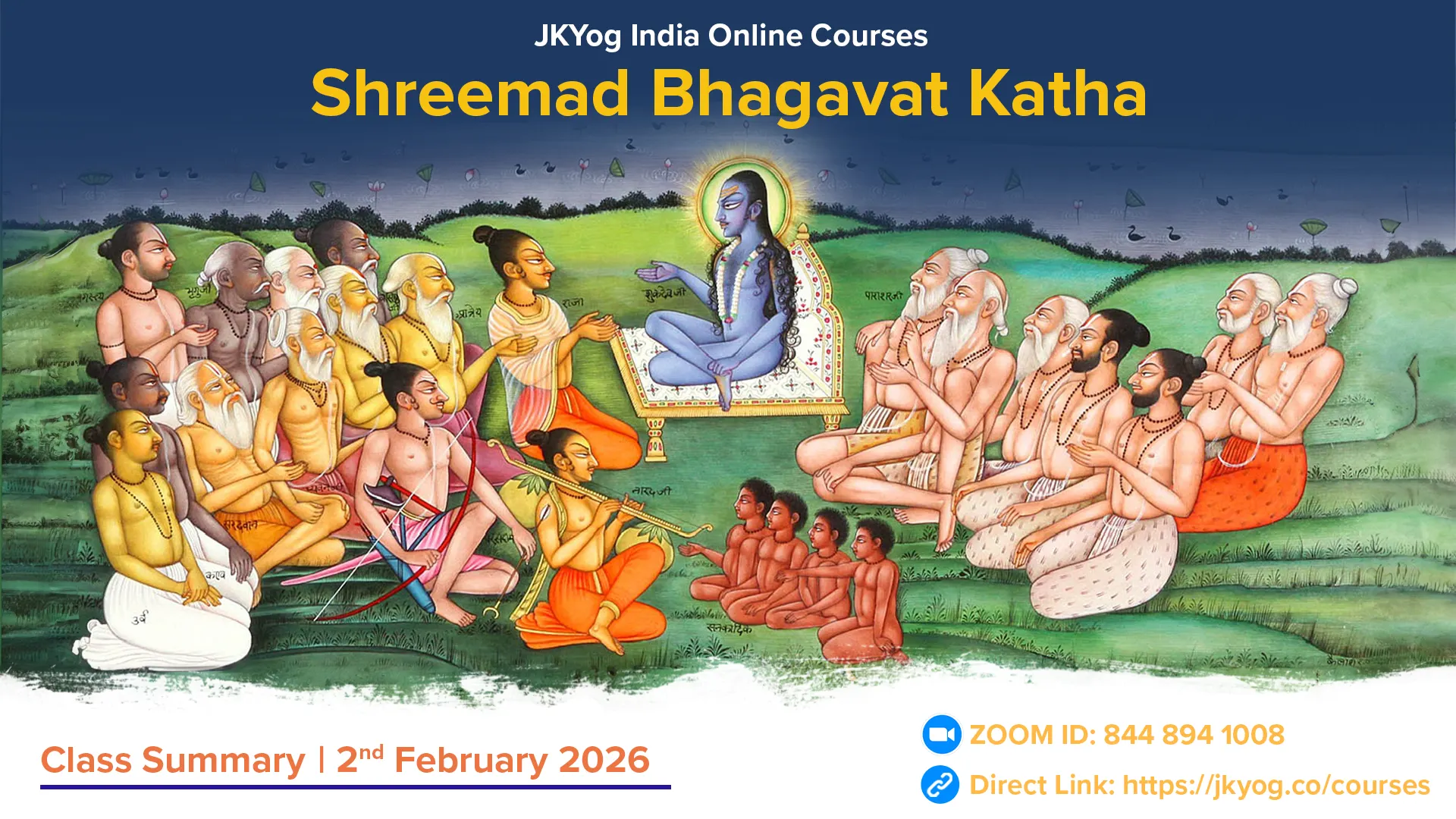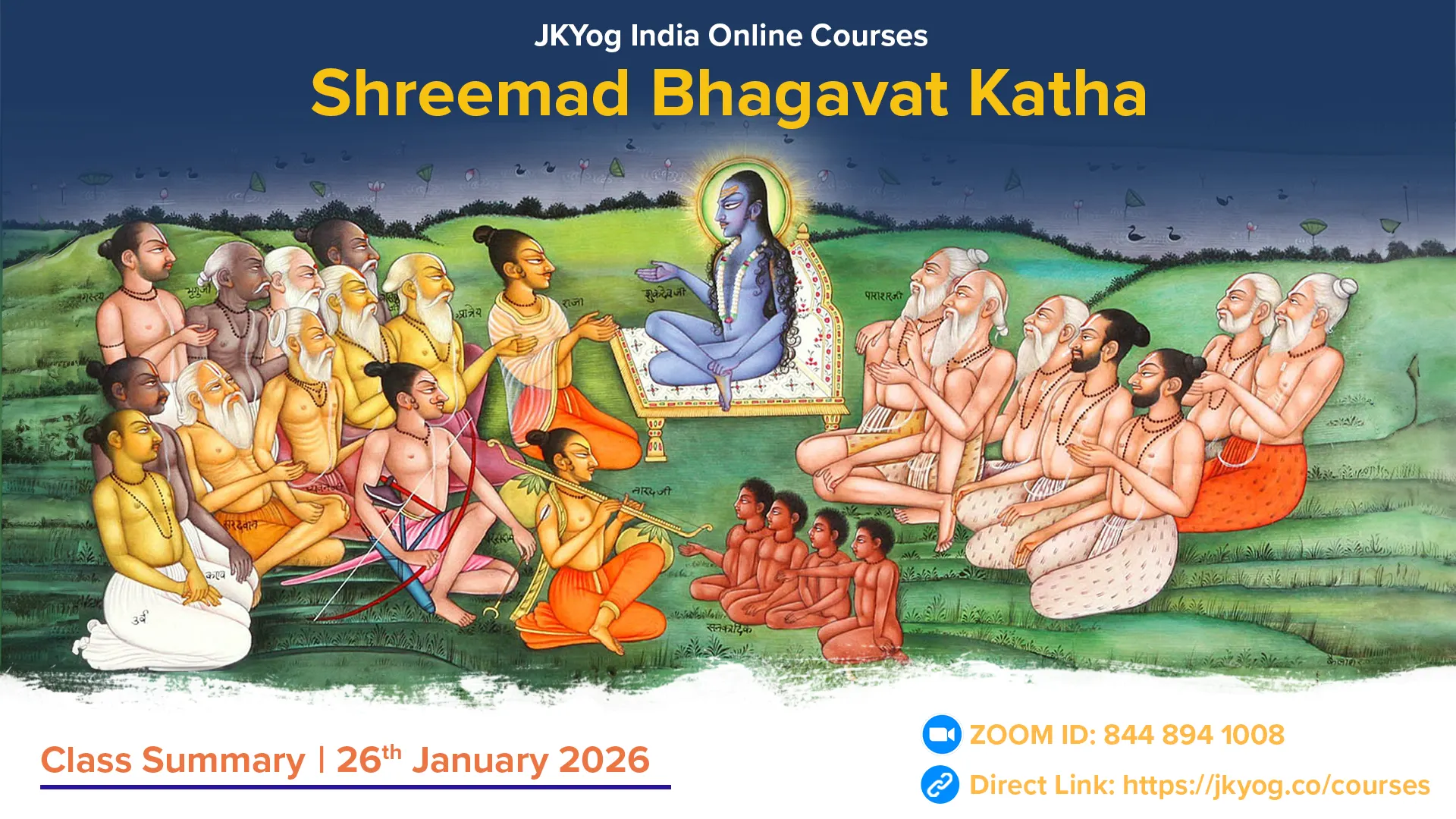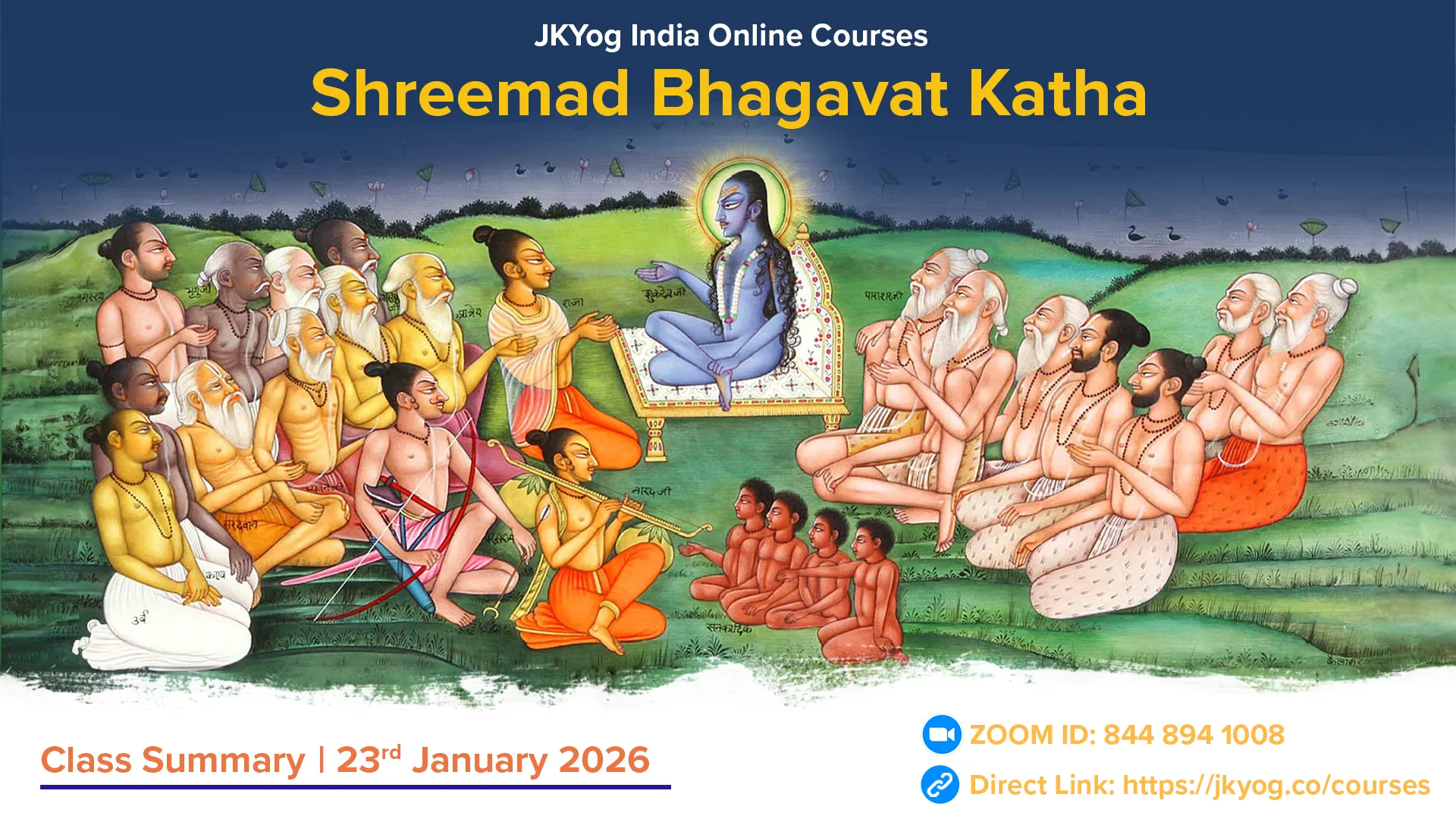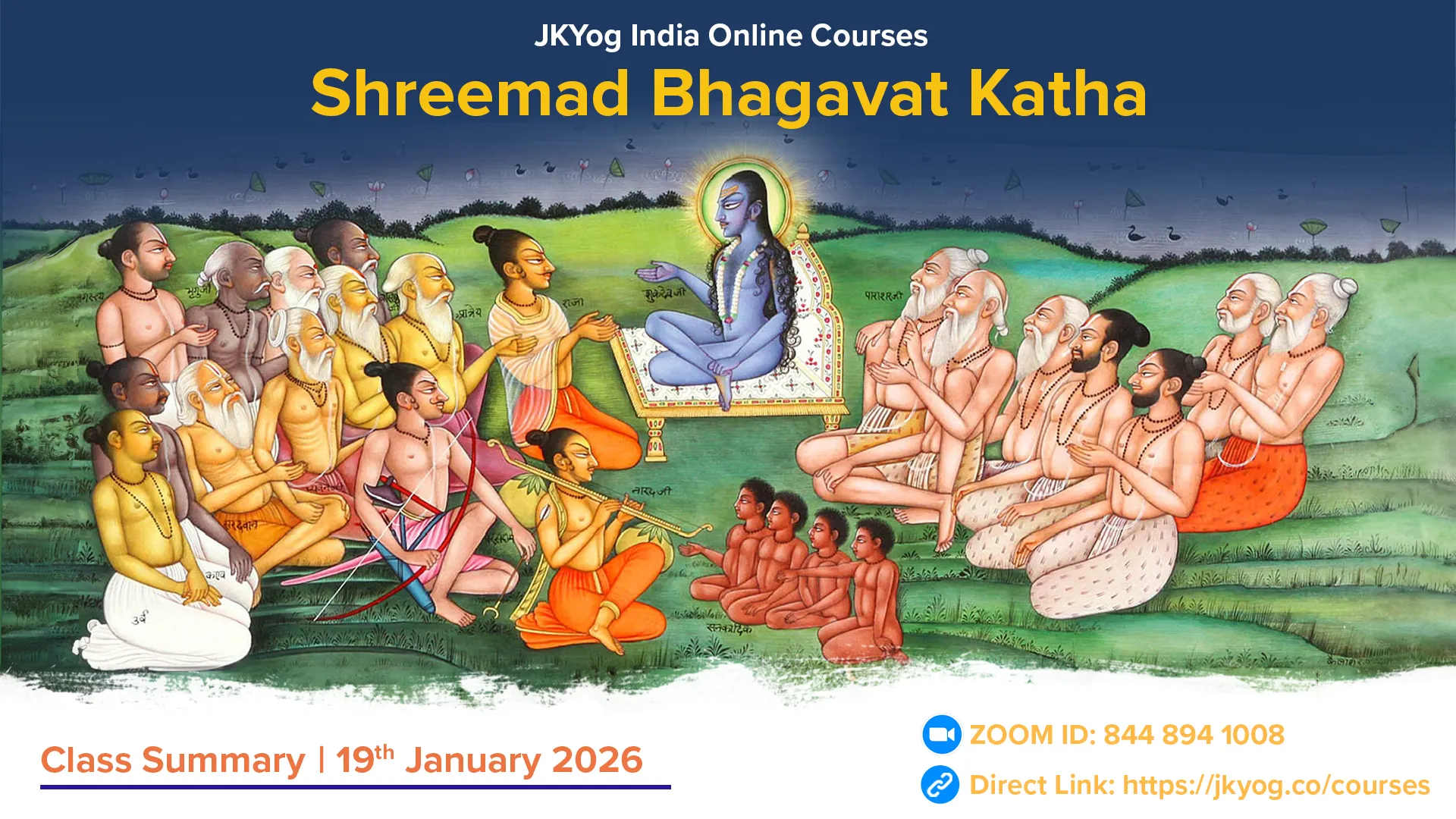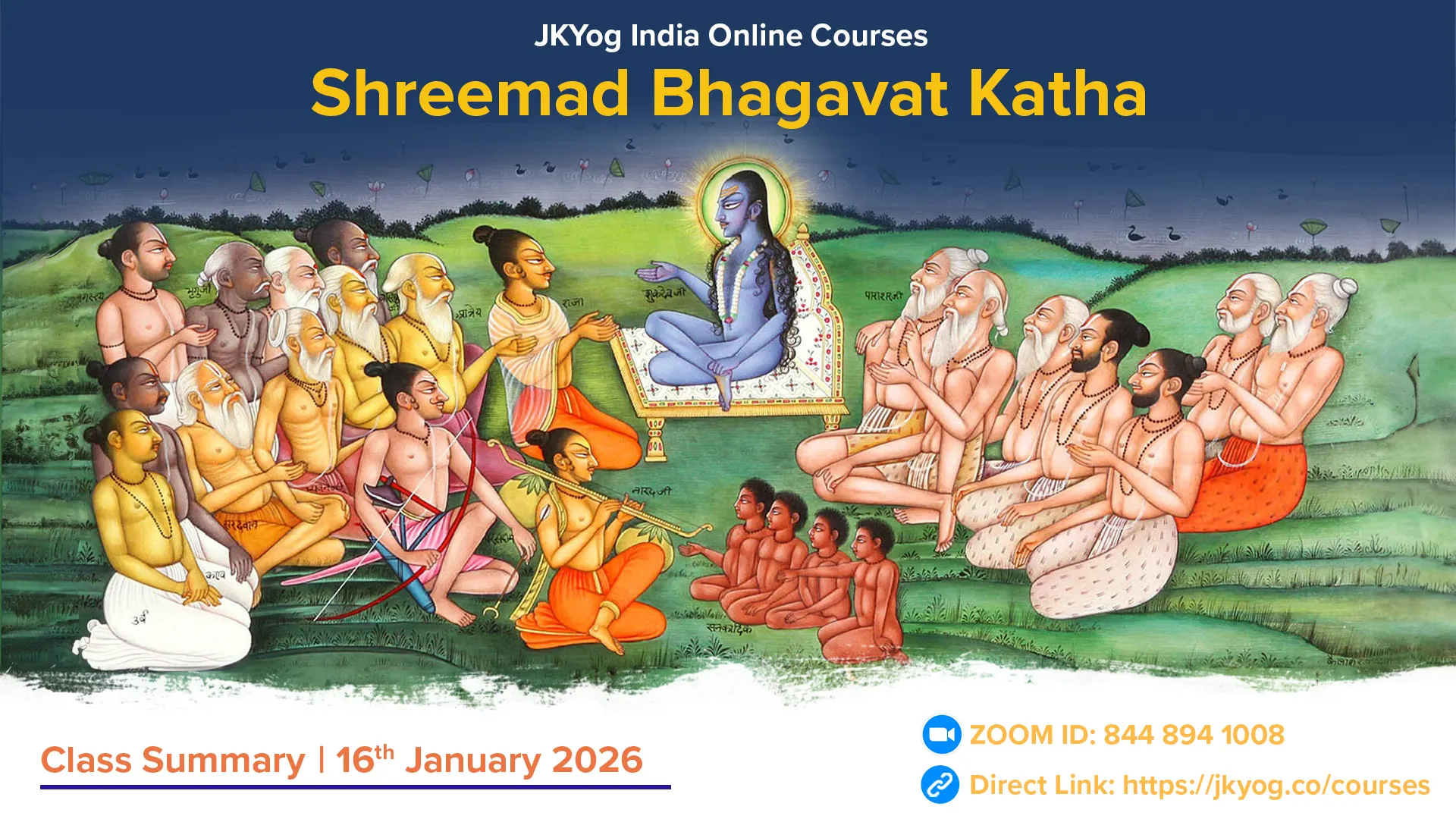Shreemad Bhagavat Mahapuran- Canto: 9, Chapters: 18-19
Shree Shukadevji says to King Parikshit, “Just as every human being has six senses, so also King Nahusha had six sons—Yati, Yayati, Samyati, Ayati, Viyati, and Kriti. Nahusha wished to hand over the kingdom to his eldest son, Yati. But Yati firmly refused. He knew well that ruling a kingdom is no easy task. One who gets entangled in kingship forgets his true self.
Meanwhile, when Nahusha once tried to behave immorally with Indrani Shachi, the Saptarishis cursed him, and he fell from the post of Indra, becoming a serpent. After this downfall, his son Yayati ascended the royal throne.
Once he became king, Yayati appointed his four younger brothers to rule the four directions of the world. He himself married Devayani, daughter of Shukracharya, and Sharmishtha, daughter of the Daitya king Vrishaparva, and engaged himself in the protection of the earth.
Hearing this, King Parikshit asked, ‘O Bhagavan! Shukracharya was a brahmin, and Yayati a kshatriya. How then did this pratiloma marriage (the union of a brahmin daughter and a kshatriya man) come to be?’
Shree Shukadevji replied, ‘O King, listen carefully. Vrishaparva, the mighty daitya king, had a proud and high-spirited daughter named Sharmishtha. One day, she went out to stroll in the royal gardens, accompanied by Devayani, the daughter of her guru Shukracharya, and a thousand female companions.
The garden was a vision of paradise: flowers bloomed in dazzling colours, lush green trees swayed gently, and the air hummed with the music of bees. At its heart lay a shimmering lotus-filled lake. Drawn to its beauty, the maidens laid their garments carefully on the banks and plunged into the cool waters. Laughing, splashing, and teasing each other, they played like carefree swans.
It was then that destiny intervened. Bhagwan Shankar, with Parvati seated beside Him, appeared riding His majestic bull, Nandi. The divine sight struck the maidens with sudden panic. Flustered, they scrambled out of the water and rushed to cover themselves. In the frantic confusion, Sharmishtha accidentally slipped into Devayani’s garments. When Devayani noticed, her fury blazed like fire.
She lashed out with scorn, “Oh! This maidservant has committed an unthinkable act. Just as a dog dares to snatch the sacred offering from a sacrifice, so has she dared to wear my clothes! I belong to the great Bhrigu lineage, revered even by Indra and Brahma. And you! Your father is an asura, no more than a disciple of my father. Yet you presume to wear my garments, as if a shudra could study the Vedas!”
Her words, sharp as poisoned arrows, pierced Sharmishtha’s pride. Her face darkened with rage, twisting like that of a venomous serpent ready to strike. Biting her lip in anger, she retorted, “Beggar-girl! Look at your own state before you dare to boast. Just as crows and dogs gather at our doors for scraps of food, so too does your family live off our household. And you call me a maidservant?”
Blinded by wrath, Sharmishtha tore Devayani’s garments from her and, overcome with rage, pushed her headlong into a nearby well.
After Sharmishtha left, by chance, King Yayati, while hunting, came to that spot. Thirsty, he peered into the well and saw Devayani lying there, without clothes. Moved with compassion, he offered her his scarf, extended his hand, and pulled her out.
At that moment, Devayani spoke in a voice filled with affection, ‘O noble king! Today you have held my hand. Now that it has once been touched by you, it can never belong to another. My falling into this well and suddenly seeing you here is no accident; it is a divine arrangement. Neither you nor I nor any human has willed this; it is the decree of destiny.
But there is one more matter. Once, I cursed Kacha, the son of Brihaspati, and he cursed me in return. Because of that, no brahmin can take me in marriage.’
(In truth, when Kacha had learned the Mrita Sanjivani mantra from his guru Shukracharya and was ready to depart, Devayani had proposed marriage. But as she was his guru’s daughter, Kacha refused. Enraged, Devayani cursed him: ‘The knowledge you have gained will be of no use to you.’ In turn, Kacha cursed her: ‘No brahmin will ever accept you as his wife.’)
Yayati thought to himself, ‘By scripture, this union is not proper, as it is a pratiloma relationship. Yet who can resist the play of destiny? Fate itself has placed this before me, and my mind is drawn toward it.’
Thus, Yayati accepted Devayani as his wife.
Later, when Devayani narrated her humiliation and the cruelty of Sharmishtha to her father, Shukracharya, his heart was deeply pained. He thought, ‘Better to live like a pigeon in the fields or in the marketplace picking up grains, than to endure such dishonour as royal priest.’ In that mood, he set off with Devayani to leave the city.
When Vrishaparva heard this news, fear entered his heart: ‘If our guru departs, enemies will prevail, or he may curse us.’ Terrified, he rushed after Shukracharya, fell at his feet, and begged forgiveness.
Shukracharya’s anger soon cooled. He said, ‘O King! I cannot abandon my daughter. If you want me to return, her desire must be fulfilled.’
Vrishaparva folded his hands, ‘Gurudev! Whatever you say, I shall obey.’
Devayani then declared her wish, ‘Father! Wherever you give me in marriage, to whomever you give me, I have one condition—Sharmishtha and her companions must become my maidservants for life.’
Vrishaparva, seeing the circumstance, agreed. Sharmishtha, understanding her family’s honour and the situation, also accepted. Thus, she and her thousand companions became Devayani’s attendants.
In time, Shukracharya gave his daughter Devayani in marriage to King Yayati. At the wedding, he warned, ‘O King! Remember, Sharmishtha is now a maidservant. Never give her a place on your bed.’
But not long after, when Devayani bore children, Sharmishtha approached Yayati privately and requested a son. Recognising her prayer and knowing that destiny cannot be resisted, Yayati consented.
Yayati and Devayani had two sons—Yadu and Turvasu. From Sharmishtha, the maidservant yet daughter of Vrishaparva, he had three sons—Druhyu, Anu, and Puru.
When Devayani learned of this, her anger knew no bounds. Filled with grief and humiliation, she returned to her father. Yayati followed, pleading with sweet words, even bowing and pressing her feet, but she would not be appeased.
When Shukracharya heard this, he was enraged. He cursed Yayati, ‘O Yayati! You are lustful, foolish, and deceitful. May old age seize you at once, the kind that makes man’s body ugly and worn!’
Terrified of sudden old age, Yayati folded his hands and prayed, ‘O Brahmin! I have not yet quenched my thirst for pleasure. If you curse me now, it will also harm your daughter Devayani.’
Shukracharya calmed somewhat and said, ‘Very well. You may exchange your old age with someone willing to give you his youth.’
So Yayati returned to his capital. He went first to his eldest son, Yadu, and said, ‘Son! Take this old age given by your grandfather and give me your youth. I have not yet satisfied myself with worldly enjoyment. If you give me your youth, I can enjoy it for some more years.’
Yadu respectfully refused, ‘Father, I would not wish to accept old age before its time. Unless one has experienced worldly pleasures, renunciation does not arise. I cannot do this.’
Likewise, Turvasu, Druhyu, and Anu all refused. They did not grasp the deeper truth of dharma and mistook the temporary body to be eternal.
Finally, Yayati turned to his youngest and most virtuous son, Puru. He said, ‘My son, you must not act like your elder brothers. You must fulfil my wish.’
Puru replied humbly, ‘Father, it is by serving one’s father that a son attains the highest state. This body, too, is your gift. What son can ever repay his father fully? A true son fulfils his father’s wish without being told. One who obeys with devotion when told is middling. One who obeys without devotion is lowly. And one who does not obey at all is not even a son—he is but his father’s excrement.’
Saying this, Puru joyfully accepted his father’s old age and gave him his youth. Yayati, taking his son’s youth, again plunged into enjoyment. He became emperor of the seven continents, ruling and protecting his subjects like a father protects his children. His senses were powerful, and he indulged freely in pleasure. Devayani remained his beloved wife, pleasing him with her mind, speech, body, and attire, and giving him joy in private.
Yet Yayati did not neglect dharma. He performed great sacrifices, worshipping Shree Hari with abundant offerings. He established Bhagwan Narayan in his heart and worshipped Him selflessly.
But still, after a thousand years of unrestrained indulgence, his craving did not end.
Shree Shukadevji says, ‘O Parikshit! Yayati lived drowned in women and pleasures. But one day, suddenly perceiving his downfall, deep detachment arose in him. Calling Devayani, he said, “A he-goat once pulled a she-goat out of a well, and she grew attached to him. Soon, many other she-goats joined. He enjoyed them all, yet never felt satisfied. My condition is the same.
Pleasure never brings fulfilment; it only multiplies desire. Bound by your affection, I lost myself in sense objects. But look! Pleasures never satisfy. Just as fire flares higher when ghee is poured into it, so too do desires intensify by indulgence.
All the grain, gold, cattle, and women of the earth cannot satisfy a man tormented by desire.
Na jatu kamah kamanam upabhogena shamyati
Havisha krishna vartmeva bhuya evabhi-vardhate
“Desire is never extinguished by enjoyment. Like fire fed with ghee, it only grows stronger.” (Bhagavat 9.19.14)
Desires are the root of sorrow. Even as the body grows old, desires remain ever new. Therefore, one who seeks his true welfare should abandon craving as soon as possible.
See! The senses are so powerful that they can disturb even the wise. A man of discernment should never trifle with them. I indulged for a thousand years, yet found no satisfaction. Now I shall renounce, surrender my mind to God, abandon pride, and immerse myself in His devotion.”’
Saying this, Yayati returned Puru’s youth and accepted his own old age. For his mind was now free of desire. He divided his kingdom: to Druhyu the southeast, to Yadu the south, to Turvasu the west, and to Anu the north. To his worthy son Puru, he gave the entire empire, and himself departed for the forest.
Like a bird leaving its nest once its wings grow, Yayati renounced everything and entered the forest. There, he attained self-realisation, transcended the three gunas, and merged into the Supreme Brahman, Bhagwan Vasudev. He attained the highest state, the same that the saints devoted to God achieve.
When Devayani heard of this, she too understood that Yayati was showing her the path of detachment. She gave up all worldly attachments, fixed her mind on Shree Krishna, took refuge in Him, and attained the supreme abode.
Namas-tubhyam bhagavate vasudevaya vedhase
Sarva-bhuta-dhi-vasaya shantaya brihate namah
She bowed and prayed, “Obeisance unto the Bhagwan Vasudev, the inner dweller of all beings, the infinite refuge of the universe, the supreme peace, the boundless one.” (Bhagavat 9.19.29)
Summary: JKYog India Online Class- Shreemad Bhagavat Katha [Hindi]- 05.09.2025

